Audi Q4 e-tron VS VW ID.7
In the competitive electric vehicle landscape, the Audi Q4 e-tron and VW ID.7 stand out for their innovative designs and technology. The Q4 e-tron offers a more upscale interior with premium materials, while the ID.7 focuses on spaciousness and practicality for everyday use. Both models feature impressive range and performance, making them compelling options for eco-conscious drivers seeking style and functionality.
Audi Q4 e-tron
The Audi Q4 e-tron seamlessly combines sustainable driving with premium comfort, embodying the brand's commitment to electric mobility. Its sleek design and spacious interior create an inviting atmosphere, perfect for those who appreciate both style and practicality. With a focus on innovative technology, the Q4 e-tron offers a dynamic driving experience that appeals to modern drivers seeking eco-friendly alternatives.
detailsVW ID.7
The VW ID.7 represents a significant step forward in Volkswagen's electric vehicle lineup, offering an elegant design combined with advanced technology features. This electric saloon showcases a sleek aerodynamic profile, prioritising both performance and efficiency. Inside, drivers will appreciate the spacious and modern cabin, equipped with intuitive controls and connectivity features for a seamless driving experience.
detailsHead-to-Head: Audi Q4 e-tron vs VW ID.7
The electric vehicle market is flourishing, and two of the most notable contenders providing innovative technology and stunning design are the Audi Q4 e-tron and the VW ID.7. Both vehicles boast impressive specifications, yet they cater to different preferences and driving needs. In this article, we will compare these two automotive marvels to help you determine which model suits you best.
Design and Body Type
The Audi Q4 e-tron is an SUV, presenting a robust and commanding presence on the road. With a length of 4588 mm, width of 1865 mm, and height of 1632 mm, it offers ample interior space for passengers and cargo alike. The spacious trunk capacity of between 520 to 535 liters ensures that you can easily accommodate your belongings.
On the other hand, the VW ID.7 is designed as a hatchback, with a longer frame measuring 4961 mm in length and a height of 1536 mm. The ID.7's width is slightly narrower at 1862 mm but still provides a comfortable environment. With a trunk capacity of 532 liters, the ID.7 remains practical for everyday use.
Performance and Efficiency
Both models feature advanced electric powertrains, but they differ in specifications. The Audi Q4 e-tron comes with power options ranging from 170 HP to a robust 340 HP, offering rear-wheel and all-wheel drive configurations. It can achieve 0-100 km/h in as little as 5.4 seconds, depending on the variant. Its electric range is notable, with several configurations boasting between 351 km and a remarkable 554 km.
In contrast, the VW ID.7 also offers a competitive range of 595 km to 709 km on a single charge, depending on the battery capacity of either 77 kWh or 86 kWh. Its performance matches the Q4 e-tron with a power output up to 340 HP and an acceleration of 0-100 km/h in as fast as 5.4 seconds as well.
Battery and Charging Technologies
When it comes to battery technology, the Audi Q4 e-tron utilizes a 52 kWh and 77 kWh battery capacity options. This allows for efficient consumption rates varying from 15.9 kWh to 17.4 kWh per 100 km, which is impressive for an SUV of its size.
The VW ID.7 leads the charge with its consumption rates, offering as low as 13.6 kWh per 100 km, making it a more efficient option overall. This lower consumption, along with its capacity options, results in excellent range performance, appealing to the environmentally-conscious consumer.
Interior and Innovations
Both vehicles prioritize passenger comfort and modern technology. The Audi Q4 e-tron is equipped with a cutting-edge infotainment system, expansive touch-screen displays, and high-quality materials throughout the cabin. With attention to detail and premium design, the Q4 e-tron promises a luxurious experience.
The VW ID.7, while slightly more utilitarian, does not skimp on technology. Its advanced infotainment and connectivity options, along with sustainable materials for the interior, make it an innovative choice. The ID.7 also embraces the latest in driver-assistance technologies, ensuring a secure and convenient ride.
Conclusion: Choose Your Champion
Both the Audi Q4 e-tron and the VW ID.7 represent significant advancements in the realm of electric vehicles, excelling in performance, efficiency, and innovation. The Q4 e-tron delivers an SUV experience with abundant comfort and luxury, while the ID.7 shines in terms of efficiency and hatchback versatility.
Your choice ultimately will depend on your specific needs: if you require more space and an SUV's reliability, the Audi Q4 e-tron is an excellent choice. However, if you prefer a more efficient, sleek hatchback experience, the VW ID.7 could be your ideal match. Whichever model you choose, you'll undoubtedly enjoy the benefits of cutting-edge electric vehicle technology.
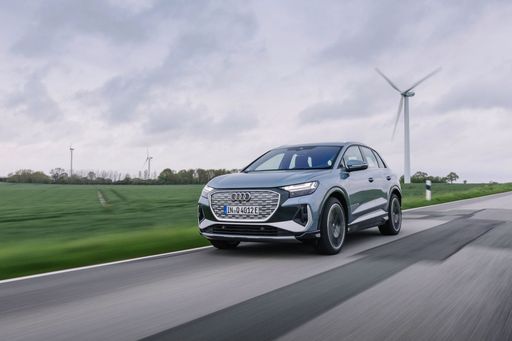 @ audi-mediacenter.com
@ audi-mediacenter.com
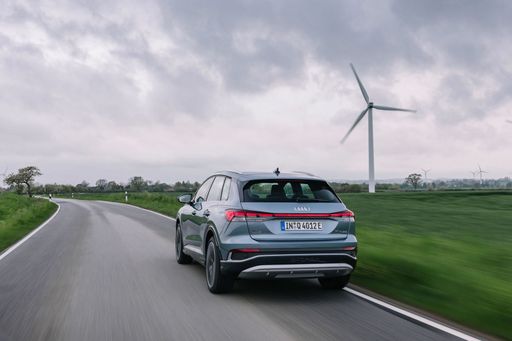 @ audi-mediacenter.com
@ audi-mediacenter.com
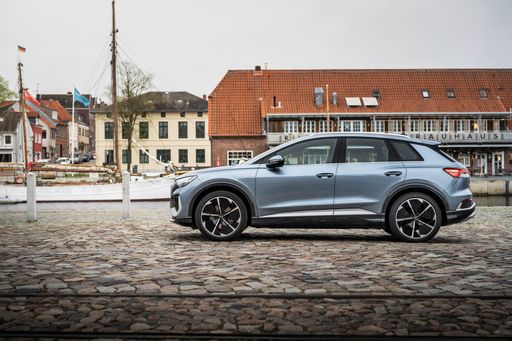 @ audi-mediacenter.com
@ audi-mediacenter.com
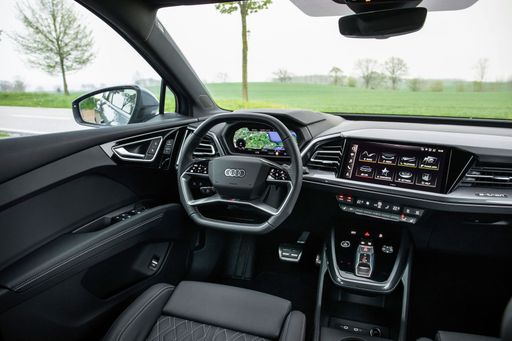 @ audi-mediacenter.com
@ audi-mediacenter.com
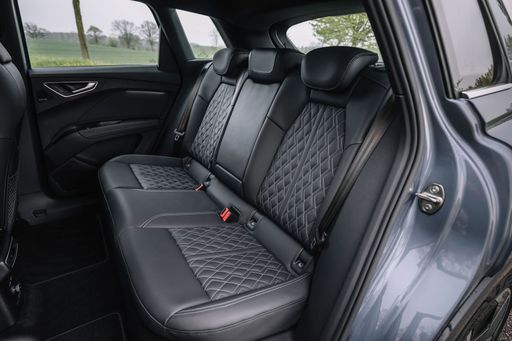 @ audi-mediacenter.com
@ audi-mediacenter.com
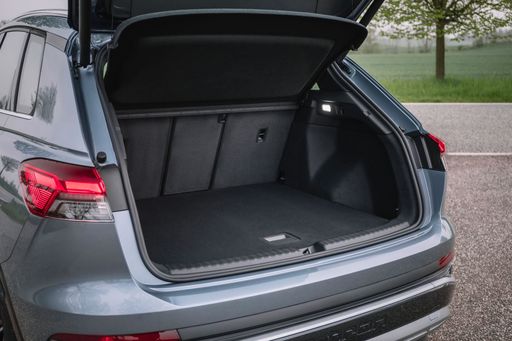 @ audi-mediacenter.com
@ audi-mediacenter.com
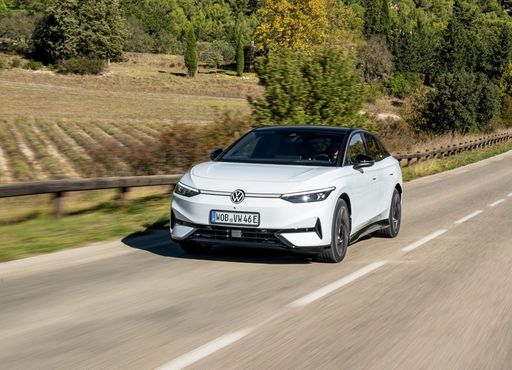 @ Volkswagen.de
@ Volkswagen.de
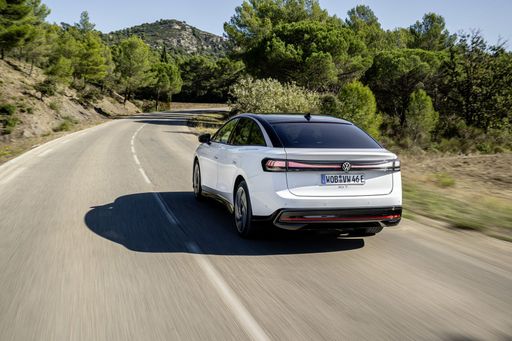 @ Volkswagen.de
@ Volkswagen.de
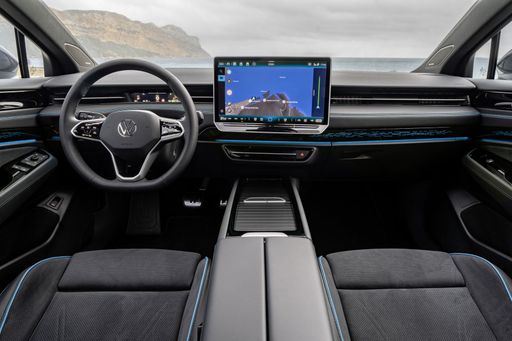 @ Volkswagen.de
@ Volkswagen.de
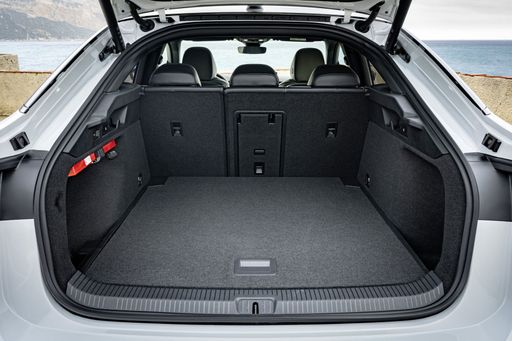 @ Volkswagen.de
@ Volkswagen.de

|

|
|
|
|
Costs and Consumption |
|
|---|---|
|
Price
about 42200 - 63400
$
|
Price
about 49900 - 58400
$
|
|
Consumption L/100km
-
|
Consumption L/100km
-
|
|
Consumption kWh/100km
15.9 - 17.4
kWh
|
Consumption kWh/100km
13.6 - 16.2
kWh
|
|
Electric Range
350 - 554
km
|
Electric Range
595 - 709
km
|
|
Battery Capacity
52 - 77
kWh
|
Battery Capacity
77 - 86
kWh
|
|
co2
0
g/km
|
co2
0
g/km
|
|
Fuel tank capacity
-
|
Fuel tank capacity
-
|
Dimensions and Body |
|
|
Body Type
SUV
|
Body Type
Hatchback
|
|
Seats
5
|
Seats
5
|
|
Doors
5
|
Doors
5
|
|
Curb weight
1990 - 2235
kg
|
Curb weight
2184 - 2328
kg
|
|
Trunk capacity
520 - 535
L
|
Trunk capacity
532
L
|
|
Length
4588
mm
|
Length
4961
mm
|
|
Width
1865
mm
|
Width
1862
mm
|
|
Height
1614 - 1632
mm
|
Height
1536
mm
|
|
Payload
510 - 515
kg
|
Payload
456 - 462
kg
|
Engine and Performance |
|
|
Engine Type
Electric
|
Engine Type
Electric
|
|
Transmission
Automatic
|
Transmission
Automatic
|
|
Transmission Detail
Reduction Gearbox
|
Transmission Detail
Reduction Gearbox
|
|
Drive Type
Rear-Wheel Drive, All-Wheel Drive
|
Drive Type
Rear-Wheel Drive, All-Wheel Drive
|
|
Power HP
170 - 340
HP
|
Power HP
286 - 340
HP
|
|
Acceleration 0-100km/h
5.4 - 9
s
|
Acceleration 0-100km/h
5.4 - 6.6
s
|
|
Max Speed
160 - 180
km/h
|
Max Speed
180
km/h
|
|
Torque
310 - 679
Nm
|
Torque
545 - 679
Nm
|
|
Number of Cylinders
-
|
Number of Cylinders
-
|
|
Power kW
125 - 250
kW
|
Power kW
210 - 250
kW
|
|
Engine capacity
-
|
Engine capacity
-
|
|
Top speed
160 - 180
km/h
|
Top speed
180
km/h
|
General |
|
|
Model Year
2023 - 2024
|
Model Year
2023 - 2024
|
|
CO2 Efficiency Class
A
|
CO2 Efficiency Class
A
|
|
Brand
Audi
|
Brand
VW
|
Audi Q4 e-tron
Introducing the Audi Q4 e-tron: The Future of Electric Mobility
The Audi Q4 e-tron marks a significant leap forward in the world of electric vehicles, combining luxury, performance, and cutting-edge technology into one dynamic package. As part of Audi's e-tron family, this SUV not only offers a sustainable alternative to traditional fuels but does so with the unmistakable elegance and comfort that the brand is renowned for.
Engine and Performance: Power Meets Efficiency
The Q4 e-tron is available in various configurations, showcasing Audi's commitment to offering choices suited to different driving styles and needs. With power outputs ranging from 170 PS to 340 PS, the Q4 e-tron allows enthusiasts and casual drivers alike to enjoy a spirited driving experience.
One of the standout features of the Q4 e-tron is its efficient energy consumption. Models achieve consumption figures as low as 15.9 kWh/100 km, enabling impressive ranges of up to 554 km on a single charge. This makes the Q4 e-tron not only a competent urban commuter but also a capable vehicle for longer journeys. The acceleration from 0-100 km/h varies between 5.4 and 9 seconds, depending on the configuration, allowing drivers to enjoy a thrilling performance without compromising on efficiency.
Battery Technology: Powering the Future
Equipped with a battery capacity ranging from 52 kWh to 77 kWh, the Audi Q4 e-tron features impressive charging capabilities. The intelligent battery management system optimally uses the stored energy, balancing performance with efficiency. This innovative approach ensures that owners can maximise the electric range without the need for frequent recharges.
Innovative Interior and Technology
Inside the Audi Q4 e-tron, luxurious materials and modern design come together seamlessly. The spacious cabin is designed for five passengers, offering ample legroom and luggage space of 520 to 535 litres, making it practical for everyday use. The digital cockpit, complete with a high-resolution display, provides essential information at a glance, while the intuitive infotainment system seamlessly integrates with smartphones for an enhanced connectivity experience.
Sustainability and Driving Dynamics
Sustainability is at the core of the Audi Q4 e-tron's design. The vehicle not only produces zero emissions but also incorporates recycled materials in its manufacturing processes, showcasing Audi's commitment to eco-friendly production. Furthermore, with optional all-wheel drive capabilities available, the Q4 e-tron ensures excellent traction and stability, regardless of road conditions, making every drive enjoyable and secure.
Conclusion: A Symbol of Electric Elegance
The Audi Q4 e-tron epitomises the brand's drive towards a more sustainable future while maintaining the performance and luxury that customers expect. With its diverse range of configurations, advanced technology, and commitment to efficiency, the Q4 e-tron is not just another electric vehicle—it's a bold statement in automotive innovation. As we move forward, this vehicle is set to become a benchmark in the electric SUV segment, offering an exemplary blend of comfort, performance, and technology.
VW ID.7
Introducing the VW ID.7: A Game-Changer in the Electric Car Market
The VW ID.7 represents Volkswagen's commitment to innovation and sustainability in the automotive market. This all-electric vehicle stands out not only for its sleek design but also for its impressive array of technological advancements. In this article, we delve into the technical specifications and innovations that make the ID.7 a remarkable addition to Volkswagen's electric vehicle lineup.
Power and Performance
Under the bonnet, the VW ID.7 is powered by a range of electric motors, offering horsepower between 286 and 340 PS. This provides the perfect blend of power and efficiency, making it an ideal choice for both city driving and long-distance journeys. With a top speed of 180 km/h and a lightning-fast acceleration from 0 to 100 km/h in just 5.4 seconds, the ID.7 doesn’t compromise on performance.
Impressive Range and Efficiency
The VW ID.7 redefines what it means to travel efficiently. Depending on the model, the ID.7 offers an electric range between 595 and 709 km on a single charge, setting new benchmarks for the industry. With energy consumption as low as 13.6 kWh per 100 km, it is one of the most energy-efficient vehicles in its class, making it both environmentally friendly and cost-effective for everyday use. The ID.7 boasts a CO2 efficiency class of A, reflecting its zero-emission status.
Advanced Technology and Safety Features
Volkswagen has equipped the ID.7 with cutting-edge technology designed to enhance the driving experience. The car features advanced driver assistance systems, including adaptive cruise control and lane-keeping assistance. Moreover, its infotainment system is state-of-the-art, offering seamless connectivity and a user-friendly interface. Safety features are also top-notch, ensuring peace of mind for drivers and passengers alike.
Design and Comfort
The ID.7's design is both futuristic and practical. Its streamlined body provides a stylish exterior, while the interior is spacious and comfortable, accommodating up to five passengers effortlessly. With a generous boot capacity of 532 litres, there is plenty of storage for all your needs. The ID.7’s dimensions, measuring 4961 mm in length and 1862 mm in width, make it a substantial vehicle that commands attention on the road.
Efficient Price Point
Despite its high-tech features and impressive performance, the VW ID.7 maintains a competitive price range, starting from €53,995. This makes it accessible to a wide range of customers seeking an eco-friendly vehicle without breaking the bank. Additionally, with monthly costs ranging between €1,197 and €1,372, it's a practical choice for those considering long-term electric vehicle ownership.
Conclusion
In conclusion, the VW ID.7 is a testament to innovation in the electric vehicle sector. Its combination of power, range, and technology sets a new standard for what drivers can expect from an electric car. As Volkswagen continues to pave the way for electric mobility, the ID.7 stands as a beacon of what's possible when cutting-edge technology meets sustainable driving practices.
